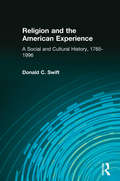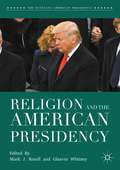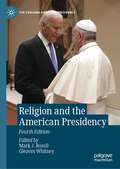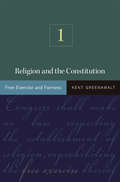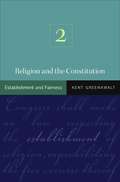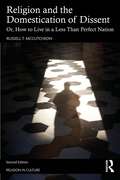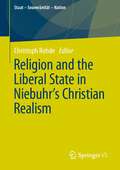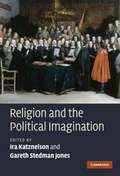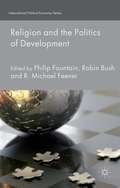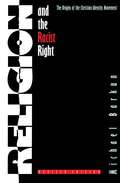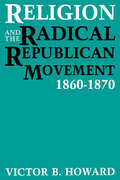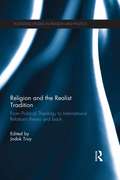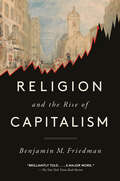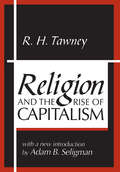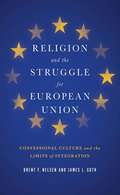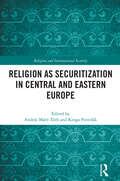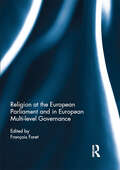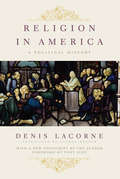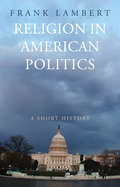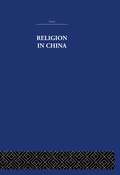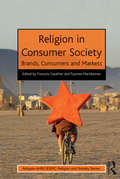- Table View
- List View
Religion and the American Experience: A Social and Cultural History, 1765-1996
by Donald C. SwiftReligion in the USA manifests itself in many forms and this book examines them, from religion in the early republic, to early African American religion, reform, nativism movements, and fundamentalism, up to the contemporary culture wars, in a study that spans almost 250 years.
Religion and the American Presidency
by Mark J. Rozell Gleaves WhitneyThis volume opens a new avenue toward understanding the politics and policies of many US presidents. As the essays in this book reveal, religion has had an enormous impact on many critical presidencies in US history. Contrary to the conventional wisdom, these essays reveal the deeply religious side to Truman, Eisenhower, and Reagan, among others.
Religion and the American Presidency (The Evolving American Presidency)
by Mark J. Rozell Gleaves WhitneyThis book chronologically analyzes fourteen key US Presidents, from Washington to Biden, to highlight how religion has informed or influenced their politics and policies. For years, leading scholars have largely neglected religion in presidential studies. Yet, religion has played a significant role in a number of critical presidencies in US history. This volume reveals the deep religious side to such presidents as Truman, Eisenhower, and Reagan, among others, and the impact that faith had on their administrations. Now in its fourth edition, this work includes analysis of Joe Biden as the second Catholic president in United States history and provides a timely update to a key text in the study of religion and the presidency.
Religion and the Constitution, Volume 1: Free Exercise and Fairness
by Kent GreenawaltBalancing respect for religious conviction and the values of liberal democracy is a daunting challenge for judges and lawmakers, particularly when religious groups seek exemption from laws that govern others. Should members of religious sects be able to use peyote in worship? Should pacifists be forced to take part in military service when there is a draft, and should this depend on whether they are religious? How can the law address the refusal of parents to provide medical care to their children--or the refusal of doctors to perform abortions? Religion and the Constitution presents a new framework for addressing these and other controversial questions that involve competing demands of fairness, liberty, and constitutional validity. In the first of two major volumes on the intersection of constitutional and religious issues in the United States, Kent Greenawalt focuses on one of the Constitution's main clauses concerning religion: the Free Exercise Clause. Beginning with a brief account of the clause's origin and a short history of the Supreme Court's leading decisions about freedom of religion, he devotes a chapter to each of the main controversies encountered by judges and lawmakers. Sensitive to each case's context in judging whether special treatment of religious claims is justified, Greenawalt argues that the state's treatment of religion cannot be reduced to a single formula. Calling throughout for religion to be taken more seriously as a force for meaning in people's lives, Religion and the Constitution aims to accommodate the maximum expression of religious conviction that is consistent with a commitment to fairness and the public welfare.
Religion and the Constitution, Volume 2: Establishment and Fairness
by Kent GreenawaltBalancing respect for religious conviction and the values of liberal democracy is a daunting challenge for judges and lawmakers, particularly when religious groups seek exemption from laws that govern others. Should students in public schools be allowed to organize devotional Bible readings and prayers on school property? Does reciting "under God" in the Pledge of Allegiance establish a preferred religion? What does the Constitution have to say about displays of religious symbols and messages on public property? Religion and the Constitution presents a new framework for addressing these and other controversial questions that involve competing demands of fairness, liberty, and constitutional validity. In this second of two major volumes on the intersection of constitutional and religious issues in the United States, Kent Greenawalt focuses on the Constitution's Establishment Clause, which forbids government from favoring one religion over another, or religion over secularism. The author begins with a history of the clause, its underlying principles, and the Supreme Court's main decisions on establishment, and proceeds to consider specific controversies. Taking a contextual approach, Greenawalt argues that the state's treatment of religion cannot be reduced to a single formula. Calling throughout for acknowledgment of the way religion gives meaning to people's lives, Religion and the Constitution aims to accommodate the maximum expression of religious conviction that is consistent with a commitment to fairness and the public welfare.
Religion and the Domestication of Dissent: Or, How to Live in a Less Than Perfect Nation (Religion in Culture)
by Russell T. McCutcheonIn its first edition, Religion and the Domestication of Dissent focused on the representations of Islam that circulated in the wake of the 9/11 attacks—representations that scholars, pundits, and politicians alike used either to essentialize and demonize it or, instead, to isolate specific aspects as apolitical and thus tolerable faith. This little book’s larger thesis therefore argued for how the classifications that we routinely use to identify and thereby negotiate our social worlds—notably such categories as “religion” or “faith”—are explicitly political.This new edition, which updates the first and adds a new closing chapter, continues to be relevant today—a time when assertions concerning supposedly authentic and homogenous identities (whether shared by “us” or “them”) continue to animate a variety of public debates where the stakes remain high. Thinking back on how Islam was often portrayed in scholarship and popular media in western Europe and North America offers lessons for how debates today unfold on such topics as Christian nationalism—a designation now prominent among pundits intent on identifying the proper and improper ways in which religion intersects with modern political life. But it is this very distinction (between religion and politics) that ought to be attracting our attention, if we are interested not in which way of being religious is right or reasonable but, instead, in determining why some social groups are known as religious in the first place. Seeing the latter question as linked to studying how socially formative categories function in liberal democracies, Religion and the Domestication of Dissent offers an anthropology of the present, when the longstanding mechanisms of liberal governance seem to be under threat.
Religion and the Liberal State in Niebuhr's Christian Realism (Staat – Souveränität – Nation)
by Christoph RohdeThis book intends to analyze Reinhold Niebuhr's understanding of the state in his Christian Realism. Although his overall notion was thoroughly analyzed in different disciplines and respects, this specific focus can be diagnosed as a lacuna. The task of this book is to develop a hypothesis in terms of under what political, social, organizational or intellectual context Niebuhr made use of what definition of the state. When did he support the extension of state power (e. g. in war times, during economic crisis) and when did he criticize tendencies toward autocratic structures inside Western style democracies?
Religion and the Making of Modern East Asia
by Thomas David DuboisReligious ideas and actors have shaped Asian cultural practices for millennia and have played a decisive role in charting the course of its history. In this engaging and informative book, Thomas David DuBois sets out to explain how religion has influenced the political, social, and economic transformation of Asia from the fourteenth century to the present. Crossing a broad terrain from Tokyo to Tibet, the book highlights long-term trends and key moments, such as the expulsion of Catholic missionaries from Japan, or the Taiping Rebellion in China, when religion dramatically transformed the political fate of a nation. Contemporary chapters reflect on the wartime deification of the Japanese emperor, Marxism as religion, the persecution of the Dalai Lama, and the fate of Asian religion in a globalized world.
Religion and the Political Imagination
by Ira Katznelson Gareth Stedman JonesThe theory of secularisation became a virtually unchallenged truth of twentieth-century social science. First sketched out by Enlightenment philosophers, then transformed into an irreversible global process by nineteenth-century thinkers, the theory was given substance by the precipitate drop in religious practice across Western Europe in the 1960s. However, the re-emergence of acute conflicts at the interface between religion and politics has confounded such assumptions. It is clear that these ideas must be rethought. Yet, as this distinguished, international team of scholars reveal, not everything contained in the idea of secularisation was false. Analyses of developments since 1500 reveal a wide spectrum of historical processes: partial secularisation in some spheres has been accompanied by sacralisation in others. Utilising new approaches derived from history, philosophy, politics and anthropology, the essays collected in Religion and the Political Imagination offer new ways of thinking about the urgency of religious issues in the contemporary world.
Religion and the Politics of Development
by R. Michael Feener Philip Fountain Robin BushEschewing tired doctrines of strict demarcation between development, religion and politics, this volume takes up the task of critically analysing this triple nexus. The chapters brought together in this landmark collection draw on detailed empirical studies from around contemporary Asia. Through their engagements with Islam, Christianity, Buddhism, and secularism, among other traditions, the chapters argue persuasively for a new research agenda that attends to the ways in which development,religion, and politics are dynamically interconnected. In doing so, they deploy innovative conceptual approaches that rework taken-for-granted frames.
Religion and the Racist Right
by Michael BarkunAccording to Michael Barkun, many white supremacist groups of the radical right are deeply committed to the distinctive but little-recognized religious position known as Christian Identity. In Religion and the Racist Right (1994), Barkun provided the first sustained exploration of the ideological and organizational development of the Christian Identity movement. In a new chapter written for the revised edition, he traces the role of Christian Identity figures in the dramatic events of the first half of the 1990s, from the Oklahoma City bombing and the rise of the militia movement to the Freemen standoff in Montana. He also explores the government's evolving response to these challenges to the legitimacy of the state. Michael Barkun is professor of political science in the Maxwell School of Citizenship and Public Affairs at Syracuse University. He is author of several books, including Crucible of the Millennium: The Burned-over District of New York in the 1840s.
Religion and the Radical Republican Movement: 1860–1870
by Victor B. Howard&“A distinctive contribution on the influence of Christians on Union politics during the Civil War era.&” —Ohio HistoryReligion and the Radical Republican Movement, 1860–1870 is a study of the interplay of religion and politics during the Civil War era. More specifically, it examines the extent to which religion set the moral tone of the North during the period of 1860 through 1870. Howard focuses on the growing influence of the evangelical and liberal churches during the period. This influence was largely exerted through the agency of the radical Republicans, a faction that took an extreme position on war measures and on reconstruction after the war. This book examines the degree to which radicalism was inspired by moral motivation and the action that followed the moral commitment. &“The author&’s prodigious research and stacks of quotations convincingly display the northern church&’s commitment to black suffrage and to the era&’s important congressional legislation bearing on black rights and other central Reconstruction issues.&” —Choice
Religion and the Realist Tradition: From Political Theology to International Relations Theory and Back (Routledge Studies in Religion and Politics)
by Jodok TroyThis volume picks up a rather uninvested field of international relations theory: the influence of religion on Realism as well as the power of Realism to address religious issues in world politics. Although classical scholars of Realism rarely mention religion explicitly in their well-known work, this volume suggests that Realism offers serious ground for taking religion and faith into account as well as evaluating the impact of religion on its theoretical framework: how religion and religious worldviews influence and affect the theoretical framework of Realism, and how Realism approach religious issues in international relations as a relatively new field of international studies. Although international relations scholars now widely deal with issues of religion, large portions of the theoretical underpinning are missing. In addressing this lack, the volume illustrates the possibility of reform and change in Realism. Furthermore, the chapters reach out to normative statements. The contributors offer a theoretical view on religion in international relations in the context of Realism but always connect this with actual, real-world related political problems. The volume takes into account not only classical thinkers and approaches of Realism but also present-day authors dealing with ethical and normative questions of international relations in the aftermath of 9/11. Offering a fresh perspective on the influence of religion on international relations theory, this work will be of great interest to scholars of religion and international relations, international relations theory, and political philosophy
Religion and the Rise of Capitalism
by Benjamin M. FriedmanFrom one of the nation's preeminent experts on economic policy, a major reassessment of the foundations of modern economic thinking that explores the profound influence of an until-now unrecognized force--religion.Critics of contemporary economics complain that belief in free markets--among economists as well as many ordinary citizens--is a form of religion. And, it turns out, that in a deeper, more historically grounded sense there is something to that idea. Contrary to the conventional historical view of economics as an entirely secular product of the Enlightenment, Benjamin M. Friedman demonstrates that religion exerted a powerful influence from the outset. Friedman makes clear how the foundational transition in thinking about what we now call economics, beginning in the eighteenth century, was decisively shaped by the hotly contended lines of religious thought within the English-speaking Protestant world. Beliefs about God-given human character, about the after-life, and about the purpose of our existence, were all under scrutiny in the world in which Adam Smith and his contemporaries lived. Friedman explores how those debates go far in explaining the puzzling behavior of so many of our fellow citizens whose views about economic policies--and whose voting behavior--seems sharply at odds with what would be to their own economic benefit. Illuminating the origins of the relationship between religious thinking and economic thinking, together with its ongoing consequences, Friedman provides invaluable insights into our current economic policy debates and demonstrates ways to shape more functional policies for all citizens.
Religion and the Rise of Capitalism (Peregrine Bks.)
by R.H. TawneyIn one of the truly great classics of twentieth-century political economy, R. H. Tawney addresses the question of how religion has affected social and economic practices. He does this by a relentless tracking of the influence of religious thought on capitalist economy and ideology since the Middle Ages. In so doing he sheds light on why Christianity continues to exert a unique role in the marketplace. In so doing, the book offers an incisive analysis of the historical background of present morals and mores in Western culture.Religion and the Rise of Capitalism is even more pertinent now than when it first was published; for today it is clearer that the dividing line between spheres of religion and secular business is shifting, that economic interests and ethical considerations are no longer safely locked in separate compartments. By examining that period which saw the transition from medieval to modern theories of social organization, Tawney clarifies the most pressing problems of the end of the century. In tough, muscular, richly varied prose, he tells an absorbing and meaningful story. And in his new introduction, which may well be a classic in its own right, Adam Seligman details Tawney's entire background, the current status of social science thought on these large issues, and a comparative analysis of Tawney with Max Weber that will at once delight and inform readers of all kinds.
Religion and the State in American Law
by Boris I. BittkerReligion and the State in American Law provides a comprehensive and up-to-date overview of religion and government in the United States, from historical origins to modern laws and rulings. In addition to extensive coverage of the religion clauses of the First Amendment, it addresses many statutory, regulatory, and common-law developments at both the federal and state levels. Topics include the history of church-state relations and religious liberty, religion in the classroom, and expressions of religion in government. This book also covers the role of religion in specific areas of law such as contracts, taxation, employment, land use regulation, torts, criminal law, and domestic relations as well as in specialized contexts such as prisons and the military. Accessible to the general as well as the professional reader, this book will be of use to scholars, judges, practising lawyers, and the media.
Religion and the Struggle for European Union: Confessional Culture and the Limits of Integration (Religion and Politics)
by Brent F. Nelsen James L. Guth<p>In <i>Religion and the Struggle for European Union</i>, Brent F. Nelsen and James L. Guth delve into the powerful role of religion in shaping European attitudes on politics, political integration, and the national and continental identities of its leaders and citizens. <p>Nelsen and Guth contend that for centuries Catholicism promoted the universality of the Church and the essential unity of Christendom. Protestantism, by contrast, esteemed particularity and feared Catholic dominance. These differing visions of Europe have influenced the process of postwar integration in profound ways. Nelsen and Guth compare the Catholic view of Europe as a single cultural entity best governed as a unified polity against traditional Protestant estrangement from continental culture and its preference for pragmatic cooperation over the sacrifice of sovereignty. As the authors show, this deep cultural divide, rooted in the struggles of the Reformation, resists the ongoing secularization of the continent. Unless addressed, it threatens decades of hard-won gains in security and prosperity. <p>Farsighted and rich with data, <i>Religion and the Struggle for European Union</i> offers a pragmatic way forward in the EU's attempts to solve its social, economic, and political crises.
Religion as Securitization in Central and Eastern Europe (Religion and International Security)
by András Máté-Tóth Kinga PovedákReligion as Securitization in Central and Eastern Europe examines the significance of securitization theory as a reference point in understanding current religious, socio-cultural, and political processes in Central and Eastern Europe (CEE).It explores contemporary social processes and discourses on security linked to religion and religious institutions. CEE has experienced many confluences of security issues with religious interpretations and world views. For instance, the international refugee and migration crisis could not be separated from the counterpoint between Christianity and Islam in political discussions. Similarly, the debates on LGBT family recognition and the traditional family model are inseparable from the “Christian family” as a reference point. The security needs of the region are particularly acute trigger points, which can be instrumentalized by political power. In other words, the threat sensitivities of collective identity make the region particularly well suited to being a focus of securitization, both from the host side and from the discourses that are enforced from above. In this volume, the authors approach the validity of securitization in relation to religion, and religion itself as securitization, from a broader perspective. They show not only what religious facts and aspects have become threatening in the process of securitization but also that the function of religion in the CEE region can be described and understood primarily as securitization. This unique collection of studies offers a comprehensive theoretical and methodological approach, while the case studies are drawn from more than seven countries in the region, by leading scholars.The book will be of interest to scholars from a wide range of disciplines including political science, history, anthropology, and religious studies. It will also function as an important introductory work for students to this specific area of research.
Religion at the European Parliament and in European multi-level governance
by François ForetThis book presents the findings of the first ever survey of the religious preferences of Members of the European Parliament (MEPs). An international research team interviewed a large sample of MEPs, with the purpose of investigating their beliefs and how these beliefs have an impact on their role as MEPs. The findings of this survey are offered in order to discuss, in a non-normative way, some key political and intellectual debates. Is Europe secularized? Is the European Union a Christian club? What is the influence of religious lobbying in Brussels? What are the dynamics of value politics? Contributions also compare MEPs with national MPs and citizens to measure whether the findings are specific to the supranational arena and European multi-level governance. External cases, such as the USA and Israel, are also presented to define whether there is a European exceptionalism regarding the role of religion in the political arena.This book was originally published as a special issue of Religion, State & Society.
Religion in America
by Tony Judt George Holoch Denis LacorneAmerica is unique in that its political institutions preceded the development of a national identity. The American Revolution and drafting of the constitution did not deepen a preexisting national self. Rather, it created a new political framework to which the "walls" of culture, particularly references to a distant past, were later added. Revisiting this moment in American history and the nation's early efforts at identity, Denis Lacorne identifies two competing narratives drawn from a reformulation of America's past, present, and future.The first narrative, derived from the philosophy of the Enlightenment, is essentially secular. Associated with the Founding Fathers and reflected in the Declaration of Independence, the Constitution, and the Federalist Papers, it is predicated on separating religion from politics to preserve political freedom from an overpowering church. Prominent thinkers such as Voltaire, Thomas Paine, and Jean-Nicolas Démeunier, who viewed the American project as a radical attempt to create a new regime free from religion and the weight of ancient history, embraced the American effort to establish a genuine "wall of separation" between church and state. The second narrative casts national identity as the outcome of a progression toward freedom, beginning with the Reformation and culminating with the colonies of Puritan New England. This alternative vision was adopted by Whig politicians and romantic historians, yet still persists among political scientists such as Samuel Huntington. These thinkers insist that America has a core, stable "American creed" based on a mix of Protestant and republican values. Lacorne outlines the role of religion in the making of these narratives and examines, against this background, how key historians, philosophers, novelists, and intellectuals situate religion in American politics.
Religion in America
by Tony Judt George Holoch Denis LacorneAmerica is unique in that its political institutions preceded the development of a national identity. The American Revolution and drafting of the constitution did not deepen a preexisting national self. Rather, it created a new political framework to which the "walls" of culture, particularly references to a distant past, were later added. Revisiting this moment in American history and the nation's early efforts at identity, Denis Lacorne identifies two competing narratives drawn from a reformulation of America's past, present, and future.The first narrative, derived from the philosophy of the Enlightenment, is essentially secular. Associated with the Founding Fathers and reflected in the Declaration of Independence, the Constitution, and the Federalist Papers, it is predicated on separating religion from politics to preserve political freedom from an overpowering church. Prominent thinkers such as Voltaire, Thomas Paine, and Jean-Nicolas Démeunier, who viewed the American project as a radical attempt to create a new regime free from religion and the weight of ancient history, embraced the American effort to establish a genuine "wall of separation" between church and state. The second narrative casts national identity as the outcome of a progression toward freedom, beginning with the Reformation and culminating with the colonies of Puritan New England. This alternative vision was adopted by Whig politicians and romantic historians, yet still persists among political scientists such as Samuel Huntington. These thinkers insist that America has a core, stable "American creed" based on a mix of Protestant and republican values. Lacorne outlines the role of religion in the making of these narratives and examines, against this background, how key historians, philosophers, novelists, and intellectuals situate religion in American politics.
Religion in America: A Political History (Religion, Culture, and Public Life #7)
by Denis LacorneDenis Lacorne identifies two competing narratives defining the American identity. The first narrative, derived from the philosophy of the Enlightenment, is essentially secular. Associated with the Founding Fathers and reflected in the Declaration of Independence, the Constitution, and the Federalist Papers, this line of reasoning is predicated on separating religion from politics to preserve political freedom from an overpowering church. Prominent thinkers such as Voltaire, Thomas Paine, and Jean-Nicolas Démeunier, who viewed the American project as a radical attempt to create a new regime free from religion and the weight of ancient history, embraced this American effort to establish a genuine "wall of separation" between church and state. The second narrative is based on the premise that religion is a fundamental part of the American identity and emphasizes the importance of the original settlement of America by New England Puritans. This alternative vision was elaborated by Whig politicians and Romantic historians in the first half of the nineteenth century. It is still shared by modern political scientists such as Samuel Huntington. These thinkers insist America possesses a core, stable "Creed" mixing Protestant and republican values. Lacorne outlines the role of religion in the making of these narratives and examines, against this backdrop, how key historians, philosophers, novelists, and intellectuals situate religion in American politics.
Religion in American Politics: A Short History
by Frank LambertThe delegates to the 1787 Constitutional Convention blocked the establishment of Christianity as a national religion. But they could not keep religion out of American politics. From the election of 1800, when Federalist clergymen charged that deist Thomas Jefferson was unfit to lead a "Christian nation," to today, when some Democrats want to embrace the so-called Religious Left in order to compete with the Republicans and the Religious Right, religion has always been part of American politics. In Religion in American Politics, Frank Lambert tells the fascinating story of the uneasy relations between religion and politics from the founding to the twenty-first century. Lambert examines how antebellum Protestant unity was challenged by sectionalism as both North and South invoked religious justification; how Andrew Carnegie's "Gospel of Wealth" competed with the anticapitalist "Social Gospel" during postwar industrialization; how the civil rights movement was perhaps the most effective religious intervention in politics in American history; and how the alliance between the Republican Party and the Religious Right has, in many ways, realized the founders' fears of religious-political electoral coalitions. In these and other cases, Lambert shows that religion became sectarian and partisan whenever it entered the political fray, and that religious agendas have always mixed with nonreligious ones. Religion in American Politics brings rare historical perspective and insight to a subject that was just as important--and controversial--in 1776 as it is today.
Religion in China
by K. Hughes E. R. HughesFirst published in 1950.Beginning with ancient times, this volume shows how some of the early superstitions became purified through the influence of the Confucianist philosophy, how a deep strain of mysticism came from the Taoists and how thereby a worship of 'Heaven' and 'Earth' was evolved. Besides the main streams of Confucianism and Buddhism, the introduction and development of Christianity into China is also analyzed.
Religion in Consumer Society: Brands, Consumers and Markets (AHRC/ESRC Religion and Society Series)
by François GauthierPresenting an overview of an emerging field in the study of contemporary religion, this book, together with a complementary volume Religion in the Neoliberal Age, explores issues of religion, neoliberalism and consumer society. Claiming that we have entered a new phase that implies more than the recasting of state-religion relations, the authors examine how religious changes are historically anchored in modernity but affected by the commoditization, mediatization, neoliberalization and globalization of society and social life. Religion in Consumer Society explores religion as both shaped by consumer culture and as shaping consumer culture. Following an introduction which critically analyses studies on consumer culture and integrates scholarship in the sociology of religion, this book explores the following topics: how consumerism and electronic media have shaped globalized culture, and how this is affecting religion; the dynamics and characteristics of often overlooked middle-class religion, and how these relate to globalization and differences between 'developed' and 'emerging' countries; emerging trends, and how we understand phenomena as different as mega churches and holistic spiritualistic journeys, and how the pressures of consumer culture act on religious traditions, indigenous and exogenous; the politics of religious phenomena in the Age of Neoliberalism; and the hybrid areas emerging from these reconfigurations of religion and the market. Outlining changes in both the political-institutional and cultural spheres, the contributors offer an international overview of developments in different countries and state of the art representation of religion in the new global political economy.
